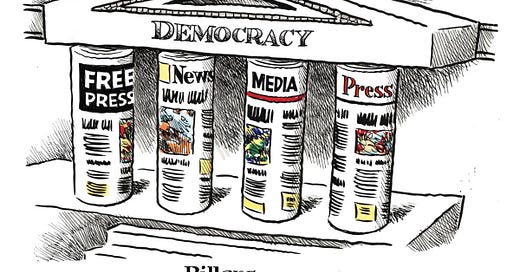Ideology versus economics
Solving our information crisis requires more than one solution because there is more than one problem
This article is part of a series of thinking examining modern media and our civic life including my new book For ALL the People coming Feb 23, 2021.
Margaret Sullivan — the brilliant and thoughtful media columnist for The Washington Post — wrote last weekend about how to start undermining Fox News by pressuring their biggest advertisers. Nicholas Kristof picked up the baton this week saying, “the problem with Fox isn’t that it’s conservative but that it monetizes conspiracy theories and disinformation in ways that are sometimes lethal.” Both pieces are worth the full read, but ultimately beg an really essential question: if Fox News is ideologically motivated, will economic pressure by sufficient to change it?
They have unquestionably benefited from the fact that their ideological goals have well-aligned with the ideological sorting and promotion of extremism inherent in our modern media systems such that their profitability aligns with their ideological goals. Undermining them by going after their revenue by shaming advertisers is clearly an opportunity to apply meaningful pressure. However, will it actually change their ideological editorial behavior? Or will they simply turn toward philanthropic subsidy (a la The Mercers and Breitbart or Bezos and The Washington Post) rather than thriving in a damaged and counterproductive (in civic terms) attention economy?
Yes, we should demand that brands face accountability for hypocritical stances. And yes, Fox News should face the declining revenue that will result from brands acknowledging that they cannot support the active undermining of democracy with their left hand while promoting civic participation with their right. But reclaiming our fourth estate is going to require more than economic incentives to ensure that we get the kind of high-quality information we need to be effective citizens. We need to revisit the underlying principles of journalism that were largely codified in the 1920s by the Columbia Journalism School. We need to revisit media ownership regulation along with broader view of antitrust enforcement. We need to revisit our definitions of public discourse, fairness, and public information and the role of the FCC in ensuring media systems provide the information our civic life demands. Sullivan and Kristof are both 100% correct — just not 100% complete.
Noam Chomsky in his most famous book, Manufacturing Consent, describes media’s role in an unequal society to provide the propaganda necessary to generate the consent of the public necessary to sustain their exploitation. In our current dysfunctional media environment, I would suggest that ideological media is is not journalism and it’s role is to manufacture the outrage necessary to fuel the political conflict required to sustain the civic dysfunction that keeps real reform from transforming America. If we want an America that is just, fair, and free, we require productive, active citizenship, and that citizenship requires healthy, accurate information systems. We can have them but have work to do. If the public is ready to support real boycotts of brands that are supporting the undermining of our democracy, we should begin there, but we must push in each of these lanes at once if we expect to shift momentum back in the direction of healthy civic discourse.
Welcome to 7 Bridges — a conversation about the future of humanity and democracy in America. If you’re joining us for the first time, hello! Subscribe via the button below to get this in your inbox for free.
Please consider becoming a paid subscriber to support this work, too. Subscribing to 7 Bridges is the best way to keep it free and open to all — and to support new voices and independent media.




